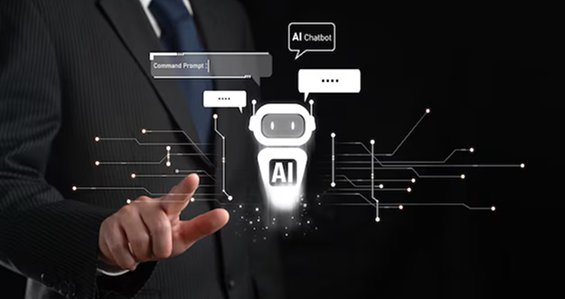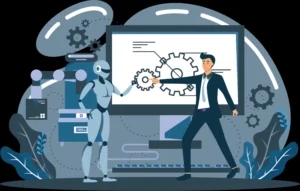Artificial Intelligence (AI) has moved beyond being a futuristic concept it is now a key driver of business growth. By automating repetitive tasks and delivering highly personalized customer experiences, AI is reshaping how companies operate, innovate, and scale.
By 2026, AI adoption will continue to rise across industries, helping businesses reduce costs, improve efficiency, and make smarter, data-driven decisions. Here’s a client-focused guide highlighting the top 7 ways AI can transform your business.
What is AI in Business?
AI in business refers to the use of machine learning, natural language processing (NLP), and intelligent automation to:
- Understand customer behavior through predictive insights
- Automate customer service and internal operations
- Optimize supply chains and logistics
- Improve financial forecasting and compliance
How Businesses Use AI Today
AI is already transforming multiple industries:
- Retail: Personalized recommendations and demand forecasting
- Finance: Fraud detection, automated reporting, and robo-advisors
- Healthcare: AI diagnostics, predictive treatments, and telemedicine
- Marketing: AI-driven content, customer segmentation, and chatbots
- Manufacturing: Predictive maintenance and quality control
7 Ways AI Will Revolutionize Your Business in 2026
1) Smarter Decision-Making
What it does:
AI transforms your business data into actionable insights in real-time. It can analyze your sales trends, inventory levels, customer behavior, and market signals to guide pricing, product mix, demand forecasting, and credit evaluations. This allows your business to make faster, more accurate, and measurable decisions.
How it works:
- Collect data from your business operations, sales, customers, and market sources.
- Clean and organize your business data for AI analysis.
- Train AI models to forecast trends, classify information, or optimize processes.
- Deploy models via dashboards or decision workflows for your business team.
- Continuously monitor and update models to maintain accuracy.
Example: Your retail business uses AI to forecast daily inventory needs. By adjusting stock levels and promotions based on AI predictions, your business reduces stockouts and markdowns while optimizing revenue.
2) Increased Efficiency
What it does:
AI automation and intelligent agents handle repetitive tasks in your business, like invoice processing, lead qualification, or scheduling, allowing your team to focus on strategic, higher-value work.
How it works:
- Map high-volume, repeatable processes within your business suitable for automation.
- Combine RPA (Robotic Process Automation) with AI models for tasks like document understanding and triage.
- Create AI agents to orchestrate multi-step operations in your business end-to-end.
- Monitor performance and adjust workflows to maintain efficiency in your business.
Example: Your service business automates contract intake. AI extracts key information, routes it to the appropriate team, and updates billing records reducing turnaround from days to hours.
3) Enhanced Customer Experience
What it does:
AI personalizes your business’s customer journeys across websites, apps, and emails. Conversational AI, like chatbots or voice assistants, provides instant, contextual support, helping your business deliver timely recommendations, relevant offers, and proactive assistance.
How it works:
- Aggregate customer data from your business into a central platform.
- Build profiles using first-party, zero-party, or consented third-party data.
- Use AI models to recommend products, content, or services for your business customers.
- Deploy chatbots or voice assistants for common queries and escalate complex issues.
- Continuously refine personalization strategies for your business.
Example: Your fitness business app suggests personalized workouts and reminders. Customers engage more frequently, boosting retention and session duration for your business
4) AI-Powered Mobile Apps & Websites
What it does:
AI adds intelligence to your business’s digital products through features like voice and image recognition, AI search, in-app assistants, and predictive analytics, making your apps and websites smarter and more engaging.
How it works:
- Identify features that provide clear value to your business users.
- Use cloud inference for heavy AI models and edge/on-device inference for latency-sensitive tasks.
- Integrate AI APIs and SDKs into your business’s mobile and web frameworks (Flutter, React, iOS, Android).
- Monitor usage and continuously improve AI models for your business.
Example: Your restaurant business app predicts peak dining times and recommends wait times or smart upsells, improving table utilization and overall revenue for your business.
5) Predictive Analytics for Growth
What it does:
AI forecasts future trends and optimizes decisions for your business. You can anticipate demand, identify churn risks, and improve marketing campaigns or inventory management.
How it works:
- Select high-value predictions for your business, such as demand forecasting or churn analysis.
- Train models using your business’s historical and real-time data.
- Integrate AI outputs into your business CRM or ERP for automated action.
- Run experiments to measure effectiveness and refine your models for your business.
Example: Your subscription business predicts which customers are likely to cancel. AI-driven retention offers help reduce churn and increase lifetime value for your business.
6) AI Consulting & Integrations
What it does:
AI consulting helps your business identify the right opportunities, choose the best tools, and implement solutions effectively, even if your team lacks in-house AI expertise.
How it works:
- Assess your business’s data readiness and AI maturity.
- Design pilot projects or PoCs to test solutions for your business.
- Integrate AI systems with your business workflows and software.
- Provide training, governance, and long-term support for your business team.
Example: Your business works with AI experts to deploy automation and predictive analytics, reducing implementation risks and accelerating results.
7) AI for Cybersecurity
What it does:
AI strengthens your business’s security by detecting anomalies, preventing fraud, and automating threat responses, protecting sensitive data and maintaining trust with your customers.
How it works:
- Collect logs, network traffic, and endpoint data from your business systems.
- Train models to identify suspicious activity or potential breaches affecting your business.
- Deploy real-time monitoring and automated response workflows for your business.
- Continuously update AI systems to adapt to evolving threats in your business.
Example: Your fintech business detects unusual transactions and blocks them before settlement, safeguarding your customers and your business reputation.
Ready to Transform Your Business with AI?
AI is transforming businesses, saving billions, and creating new revenue streams.
Practical Next Steps for Your Business
1. Identify 2–3 high-impact AI opportunities in your operations or customer experience
2. Run a 4–8 week PoC (Proof of Concept) to test AI solutions
3. Establish a single source of truth for data and basic ETL pipelines
4. Use AI tools like Replit, Copilot, Claude, or OpenAI for rapid prototyping
5. Implement governance: data privacy, monitoring, retraining
6. Communicate with your teams and reskill employees AI is here to augment, not replace
The Future of AI in Business
AI is moving from a support tool to a core business driver. The future promises:
- AI-Powered Virtual Assistants – Streamline support and operations
- Hyper-Automation of Workflows – Reduce human error and save time
- Generative AI for Content & Design – Create personalized marketing materials fast
- Emotion AI for Customer Insights – Understand customer sentiment in real-time
Businesses that embrace AI will make smarter decisions, innovate faster, and maintain a competitive edge.
Conclusion
Artificial Intelligence is no longer optional it’s a strategic advantage that can transform your business operations, customer experiences, and growth potential. From smarter decision-making and predictive analytics to AI-powered apps and cybersecurity, the opportunities for your business are limitless.
At Equitysoft Technologies, we help businesses harness the full potential of AI by providing tailored solutions, expert consulting, and seamless integrations. Whether you’re looking to automate workflows, enhance customer experiences, or implement advanced analytics, Equitysoft ensures your business stays ahead in the rapidly evolving digital landscape.
Partner with Equitysoft to leverage AI effectively, drive innovation, and achieve measurable results for your business in 2026 and beyond.
FAQs on AI Business Strategy
Everything Businesses Need to Know About AI Strategy & Adoption







